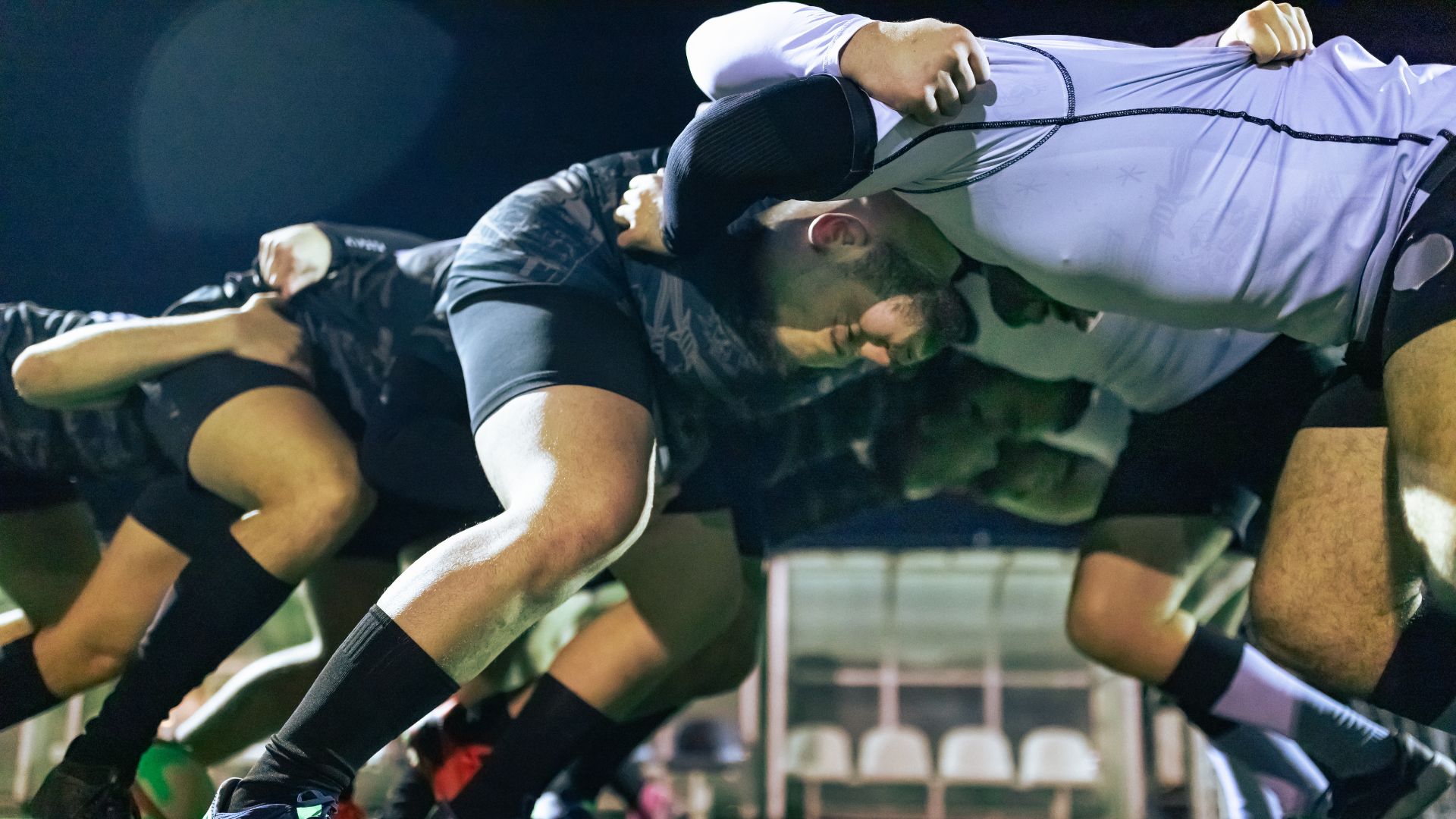Have you ever wondered why rugby players assemble into what appears to be a human sandwich?
It’s known as the scrum in rugby. It’s an essential component in rugby union.
Let’s examine the purpose of scrums and their significance.
The Primary Purpose: Restarting Play and Battling for Possession
Scrums aren’t just for show. They serve two main purposes in rugby:
- Restarting play after minor infractions
- Giving teams a fair shot at gaining ball possession
Consider it the equivalent of a reset button in rugby. The referee signals for a scrum whenever there is a forward pass or knock-on.

It’s All About That Pack Power
In scrums, the big lads really show off. The forward pack, which consists of eight men, faces off against the pack of the other team.
It’s a test of coordination, technique, and physical strength. The force is concentrated on the front row, which consists of a hooker and two props.
More Than Just Brute Force
While scrums might look like a simple pushing contest, there’s a lot more going on:
- They test team strength and cohesion
- Create opportunities for attacking plays
- Showcase scrummaging techniques
A well-executed scrum can be a game-changer, giving your team a significant advantage.
The Scrum Formation: A Delicate Balance

Setting up a scrum is like assembling a puzzle. Each piece has its place:
- The front row: Two props and a hooker
- The second row: Two lock forwards
- The back row: Two flankers and a number 8
The scrum-half, hovering at the edge, is ready to snatch the ball and kickstart the next play.
Rules of Engagement: Keeping It Safe and Fair
World Rugby has strict rules governing scrums to ensure player safety and fair play:
- The engagement process is carefully controlled
- Binding techniques are closely monitored
- Collapsed scrums are quickly reset
These regulations help prevent injuries and maintain the integrity of the contest.
Scrums: A Strategic Goldmine
For rugby tacticians, scrums are a treasure trove of opportunities:
- They can be used to tire out the opposition
- Create mismatches in the backline
- Set up powerful driving mauls
A dominant scrum can demoralise the opposition and swing momentum in your favour.
From restarting play to testing team strength, the scrum is a fundamental aspect of rugby that showcases the sport’s unique blend of power, skill, and strategy.
The Art of Scrummaging: Technique Matters
Scrummaging isn’t just about raw power. It’s a fine art that requires:
- Proper body positioning
- Synchronized pushing
- Effective binding techniques
The best scrummagers combine strength with technical proficiency, often turning the tide of a match.
The Unsung Heroes: Props and Hookers
While backs often get the glory, props and hookers are the backbone of any scrum:
- Props provide stability and power
- Hookers compete for the ball
- Their teamwork is crucial for scrum success
These front-row warriors endure immense pressure and play a vital role in their team’s performance.
When Scrums Go Wrong: Penalties and Free Kicks
Scrums can be a source of penalties if not executed correctly:
- Collapsing the scrum
- Early pushing
- Incorrect binding
These violations may result in penalties or free kicks, which could alter the flow of play.

The Scrum-Half: Connecting the Front and Back
To fully realize the potential of the scrum, the scrum-half is essential:
- They feed the ball into the scrum
- Decide when to retrieve the ball
- Link the forwards to the backs for the next play
A clever scrum-half can exploit even the slightest advantage gained from a scrum.
Scrums Across Rugby Codes
While we’ve focused on Rugby Union, it’s worth noting that Rugby League also uses scrums:
- League scrums are less contested
- They involve fewer players
- The ball is rarely hooked in League scrums
These differences reflect the distinct strategies and flow of each code.
Training for Scrum Dominance
Teams invest significant time in perfecting their scrum:
- Specialized scrum machines are used
- Players focus on individual and collective techniques
- Fitness regimes are tailored for scrummaging demands
This dedication underscores the scrum’s importance in modern rugby.
The Future of Scrums in Rugby
As rugby evolves, so does the approach to scrums:
- There’s ongoing debate about scrum safety
- Some suggest reducing the contest element
- Others argue for preserving the scrum’s traditional role
Whatever the future holds, the scrum remains an integral part of rugby’s identity, combining power, skill, and strategy in a unique test of team strength.